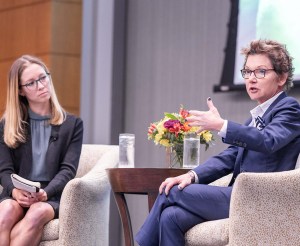As a community-engaged bank, the SF Fed seeks out real-time information on economic conditions by engaging with and learning from businesses, community organizations, and local leaders. These conversations are one of the many inputs into the decisions and policymaking at the Federal Reserve as we pursue our mission.
Here’s a snapshot of the 2024 Regional Bankers Forum in Salt Lake City where the SF Fed engaged with Community Bankers in the Twelfth District.
Community banks have an intimate understanding of their customers’ financial needs. That’s why it’s important for the SF Fed, as a community-engaged bank, to understand the state of their business, the concerns of their customers, and the economic trends facing the Twelfth District.
The Regional Bankers Forum brings together SF Fed representatives and community banking executives from across the district for a series of in-depth discussions about the financial system and the economy. These conversations are one of the many inputs into the decisions and policymaking at the Federal Reserve as we pursue our mission. Conversations with our communities help us understand the different economic experiences of the people we serve, such as small business owners, people facing barriers to economic participation, and large employers that drive local economic growth.
Addressing Bankers Top Concerns
This year’s event kicked off with a presentation from the SF Fed’s Supervision + Credit (S+C) team on the topics that bankers told us were top of mind in the community banking space. The conversation, led by a team of S+C subject matter experts sharing their field perspectives, centered on the state of community and regional banks, commercial real estate, compliance risk management, and discount window readiness.
The session’s informal dialogue was built on questions submitted by the local participants, which centered on the industry’s challenges as banks navigate a prolonged high interest rate environment. Following the meeting, the SF Fed team highlighted some recent supervisory guidance pertaining to emerging risks and consumer compliance topics, as well as webinars and references for ongoing engagement and learning.
Implementing Instant Payments
Later in the day, the Forum featured a fireside chat between Mark Gould, the Federal Reserve’s Chief Payments Executive, and Emily Lee, Director of Payments at Capital Community Bank of Utah, about instant payments and the FedNow Service, a tool specifically for community banks to make instant payments accessible to financial institutions and its customers, that was in-person and livestreamed to bankers districtwide.
At the forefront of Mark and Emily’s discussion was the topic of the implementation of the FedNow Service and the results of integrating instant payments into Capital Community Bank’s business.
Mark kicked off the dialogue by announcing that 800 banks have adopted FedNow since its July 2023 launch, adding that this is a great start, with continued room for expansion to the more than 9,000 financial institutions in the United States.
They discussed the issue of fraud and risk prevention in instant payments, agreeing that tackling fraud will require close collaboration between bankers and the Fed, citing ongoing education as key as AI tools become more prevalent and criminals grow more sophisticated.
Looking toward the future, both speakers shared their insights on the trajectory of FedNow and the evolving landscape of payments. Emily underscored the importance of formulating a comprehensive payment strategy, urging community banks to involve all departments in the decision-making process before adopting FedNow. She also emphasized the significance of exploring various service providers to tailor solutions to specific needs.
The SF Fed is committed to listening and learning to the businesses in our district and by extension the citizens they serve. The feedback we receive is paramount in ensuring a healthy financial system with financial institutions of all sizes including community banks. Through active dialogue with community bankers, we better understand the state of their business, the concerns of their customers, and the economic trends of the future.
The views expressed here do not necessarily reflect the views of the management of the Federal Reserve Bank of San Francisco or of the Board of Governors of the Federal Reserve System.



